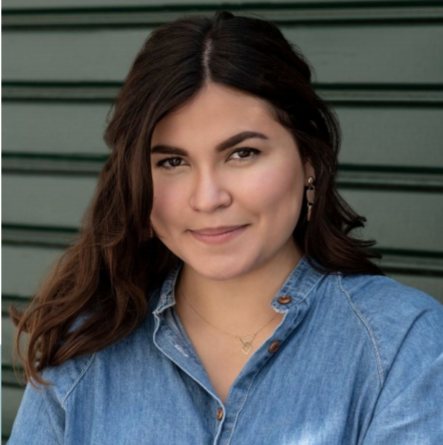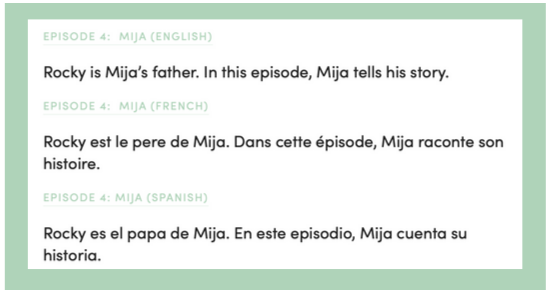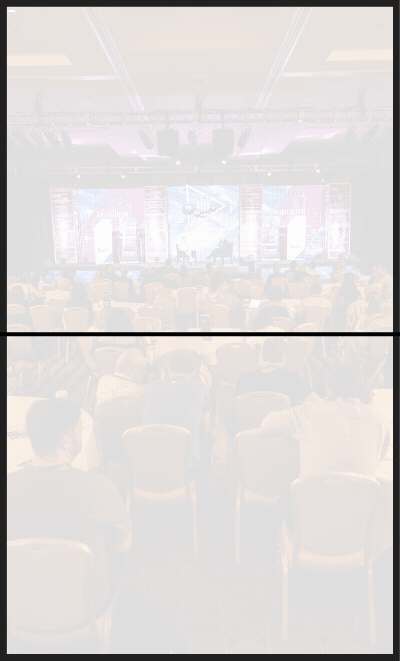![]()
 Lory Martinez, founder and CEO of Paris-based Studio Ochenta, is an inspiringly busy creator. Making audio stories in different languages is a clear calling for the trilingual podcaster. PM caught up with Martinez to discuss one particularly special and groundbreaking show: Mija podcast, which hit #1 in the in fiction charts in France and Spain on October 7.
Lory Martinez, founder and CEO of Paris-based Studio Ochenta, is an inspiringly busy creator. Making audio stories in different languages is a clear calling for the trilingual podcaster. PM caught up with Martinez to discuss one particularly special and groundbreaking show: Mija podcast, which hit #1 in the in fiction charts in France and Spain on October 7.
Launched at the end of September, Mija is an audio drama written and hosted by Martinez. It’s a fictionalized yet deeply personal story of a Colombian-American family’s immigration to the United States across generations. Our conversation was a learning experience about the joys and challenges of translation, how Mija fits into France’s developing podcast space, and what’s next for French podcasting.
Raised in Queens, New York City by Colombian parents, Martinez moved to Paris, France in 2015, where she founded Studio Ochenta. The multilingual podcast consulting and production studio is “raising voices across cultures.” Ochenta translates and adapts audio shows to other languages in addition to creating original content in French, Spanish and English. (The word ochenta means “eighty” in Spanish. The studio's originals are produced in short seasons of 8 episodes, 10 minutes each.)

Each episode tells the story of a family member’s journey to the U.S. “At a time when many are questioning what it means to be American, Mija aims to celebrate immigrants and their contributions,” expresses its description.
Martinez records each episode in Spanish, English, and French, infusing the narrative with an authenticity of emotion rarely heard in translations.
![]()
Martinez on the development of Mija’s trilingual concept:
“The story is very universal. It’s one thing to translate all your stuff, but it’s another to decide that your story is worth translating. I think the studios that are starting to translate are starting to face that question: ‘Which one of our stories is worth telling to a global audience?’
For Ochenta, it was immediately obvious to me that for something like Mija podcast, it would have to be translated like [this]. It was a natural kind of thing to already imagine it in English and Spanish, and then decide, well, I’m well known enough in France to be able to establish a following here.

I’m very proud to say that this Colombian story, this American story, a Latinx story during Latinx Heritage Month, is being listened to by French people and they see themselves in it. That’s so cool.”
![]()
On the power of music and sound in Mija:
In a recent Twitter post, Martinez wrote, “Making Mija podcast is so fun because I get to create this musical photograph of Latinx life in New York. It takes me hours to pick the right beat and rhythm to go with the music.” City sounds, hip hop, and string instruments are key to the immersive feel of the show, which sets it apart from most podcasts in French.
LM: “Sound design is not something I’m able to do as much in podcasting in French because the most popular format is interviewing. I was excited to get back into the narrative format that I used to do in English. I think a lot of [feeling the story] has to do with the sound design.
It felt so good to be able to play with those sounds. I think the story is so musical that it fits well. For one bit in the first episode, there’s sound design with drums. It’s a concept that’s very specific. I was afraid of translating it to French because they don’t tell stories in the same way, and it’s not necessarily something that could resonate.
But because I did the sound design with examples that were signaled by a sound, and then that turns into a salsa, it comes together really nicely. The meaning is not lost, and that feels great. I’m very happy that I'm able to do that kind of sound design that helps people stay in the story, in addition to just having the language.”
![]()
On France’s evolving podcast landscape:
LM: “I came to France in 2015, so podcasting just blew up in the States and I was here from when it started blowing up in France. We’re about a year and a half behind, but it’s catching up very quickly.
There’s a lot of investing in French podcasting right now, and the same thing is happening with Latin America, so I'm in the right place at the right time. [Audio dramas] are starting to be a thing in France. At first, it was a lot of interviews, and now finally we’re getting to fiction programs. A lot of French people listen to English-language fiction programs.”

“When I put Mija Podcast out in French, it was right after Passenger List. The fictional drama category in France is new — awareness is an issue. But people are starting to get the budgets to do it; we’re getting to the point now where there’s funding and more people are enjoying different formats. In about 6 months, we’ll have way more fiction podcasts in France.”
![]()
On Mija’s fictional story as a French podcast:
“There’s so much more representation in fiction. That’s also why I decided to write Mija as a fiction as well because I felt like there’s a space for my story in the fictional space. I can’t compete with the BBC’s documentaries or Radio France. They have their way of doing it, and I feel like in the way that I can tell my story, it was just perfect to do it as a fiction.
We come from a culture of storytelling in the U.S. Narrative is our format, while the French own interview and commentary. France has amazing society and culture formats done by their public radio — it’s less narrative. It’s a completely different way of telling stories, which also affects the way that people accept fiction and get into the mood to listen to fiction that way.
At the same time, something like Mija is in a format that is not as disruptive to the ear. You feel like you’re listening to someone tell a story, but you’re not necessarily listening to actors in a place doing a thing, which is a completely different way of doing fiction.”
![]()
On podcast advertising and creator revenue in France:
“The problem with the French market is that we don’t like ads, culturally. Americans love ads, and this is something that everybody tells me — ‘You’re American. Of course you like money and advertising and business.’ Because it’s true, we have a very strong culture of advertising and storytelling in advertising. At the Super Bowl, people tune in for the ads. In France, no one understands that.
It’s disruptive to the listener and people don’t like it. I think the subscription services that are appearing now are possibly going to be a solution for that. The other option would be Patreon and things like that, which have seen some success. The biggest [French] podcasters have some very powerful campaigns on Patreon.
The models that work in other countries are possibly something Americans could be inspired by. Each market is going to respond differently. Our own [subscription services] here — is it going to work in the same way that Luminary does or doesn’t work in the States? It’s like the wild West still, and there’s no law. We’re operating in this world without rules. There’s a lot to see and it’s growing.”
![]()
Season 1 of Mija began publishing weekly every Wednesday on September 25. It will have an 8-episode run of 10-minute episodes. Like all of Studio Ochenta’s Original programs, it will be available in English, French and Spanish versions, with transcripts available on ochentastudio.com for greater accessibility.




Join the Movement